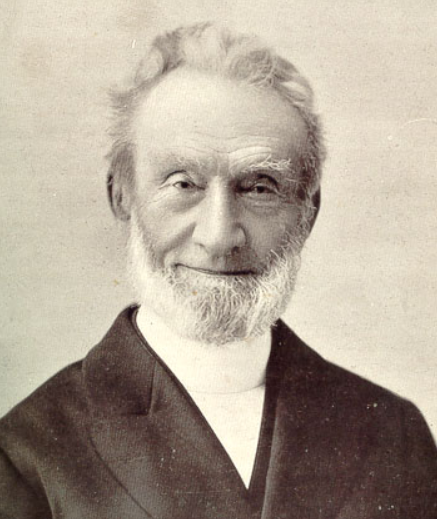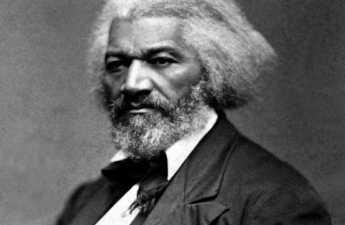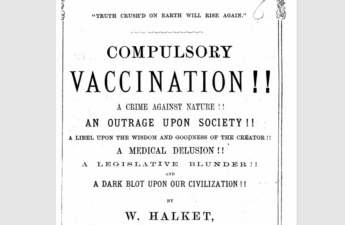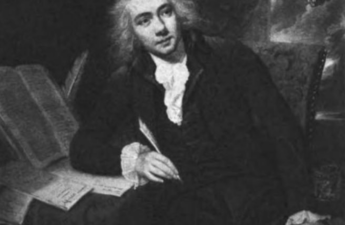
by Steve Halbrook
“For God hath not given us the spirit of fear; but of power, and of love, and of a sound mind.” 2 Timothy 1:7, KJV
George Muller (1805-1898) was an evangelist and missionary — but is most famous for his faith and involvement with orphanages in Bristol, England:
George Muller had a love for God and this self denying and God glorying pursuit led him to engage in ministry to orphans. In Bristol during his time, there was a massive problem with orphans. When Muller recognized it, he put his hand to the plough and never looked back. Muller prayed for God to provide the land, and God provided. He prayed for God to provide the housing, and God provided. He then prayed for God to provide the children, and God provided. The first orphan entered Muller’s care on 11th of April 1836. The first entry into their log books was Charlotte Hill. Over the course of Muller’s ministry, he would care for over 10,000 orphans and through his ministry beyond his death, 17,000 orphans in total would be ministered to. He was serving as unto the Lord rather than unto men.
Josh Buice, Legacy of Faithfulness: George Muller, G3 (November 24, 2015). Retrieved March 11, 2023, from https://g3min.org/legacy-of-faithfulness-george-muller
Here is a famous story about Muller’s faith:
“The children are dressed and ready for school. But there is no food for them to eat,” the housemother of the orphanage informed George Mueller. George asked her to take the 300 children into the dining room and have them sit at the tables. He thanked God for the food and waited. George knew God would provide food for the children as he always did. Within minutes, a baker knocked on the door. “Mr. Mueller,” he said, “last night I could not sleep. Somehow I knew that you would need bread this morning. I got up and baked three batches for you. I will bring it in.” Soon, there was another knock at the door. It was the milkman. His cart had broken down in front of the orphanage. The milk would spoil by the time the wheel was fixed. He asked George if he could use some free milk. George smiled as the milkman brought in ten large cans of milk. It was just enough for the 300 thirsty children.”
GeorgeMuller.org (June 29, 2016). Retrieved March 11, 2023, from https://www.georgemuller.org/devotional/a-famous-story-about-mullers-faith
Faith, of course, should apply to all areas of life, and we find this in Muller regarding matters of health.
George Muller on conscience and vaccination
During its day, smallpox vaccination commonly killed and destroyed the health of countless people (just as vaccines do today). As it concerns Muller here, there was a father who lost one child to vaccination, and may have nearly lost another.
At the time, vaccination was mandatory. The father, now seeing vaccination as wrong, asks Muller whether he should break the law. The Anti-compulsory-vaccination Reporter in 1878 reports:
In a letter I have received from Mr. Evans, of Dowlais, he says: “I wrote to Mr. George Muller, Bristol, asking him to tell me what he, with his vast experience, thought was my duty. I had lost a child through vaccination, and believed I nearly lost another. My conscience told me vaccination was wrong. Should I obey the law or my conscience? He replied it is my duty to walk with God, according to the light of conscience.”
Anti-compulsory-vaccination Reporter, Vol. III, no. 1 (October 5, 1878), 24.
(Indeed, when Caesar tells us to engage in the evil practice of vaccination, we must refuse and “obey God rather than men.” [Acts 5:29b, ESV])
Whatever Muller personally believed about vaccination, he at least respected one’s conscience on the matter — even to the point of defying Caesar. He was not a rabid pro-vaxxer, dominated by a spirit of fear.
Actually, given his experience with the failures of vaccination years prior at his orphan homes (as discussed below), if he wasn’t opposed to vaccination back then, he may have been by the time of the letter advising to walk by one’s conscience (which, being discussed in 1878, was presumably before the health crisis in his orphan homes discussed below).
Muller and the Bristol health crisis
Prior to Muller’s advice above about vaccination, in 1872, a sickness — said to be smallpox — occurred throughout his orphan homes where many became ill and some died. This is despite all orphans being vaccinated. As Muller writes,
It pleased the Lord, to lay upon us during the year the heavy trial of allowing the Small Pox to enter among the Orphans, though every child under our care had been vaccinated.
George Muller, A Narrative of Some of the Lord’s Dealings with George Müller. Fifth Part. (London: J. Nisbet & Co., 1874), 528.
So much for vaccine efficacy. Even so, the following commentary describing the situation (originally published in The Lancet) from a rabid pro-vaxxer denigrates Muller’s faith and decision to not hastily re-vaccinate the orphans after the sickness struck (in so doing, the commentator ironically confesses to the failure of vaccination; if a quack remedy fails, you don’t keep using it — you jettison it entirely!):
GEORGE MULLER, of Bristol, and his orphans, are known wherever the Christian faith is known. It is with great regret that we read in the report of the New Orphan Houses for the year ending May 26th, 1872, that “it pleased the Lord” to allow the small-pox to enter the New Orphan House, No. 5, in January, 1872. From that time to July the disease increased. Thus in House No. 1, with 298 inmates, there were 7 cases and 1 death; in No. 2 with 362 inmates, 90 cases and 3 deaths; in No. 3, having 444 inmates, there were 95 cases and 8 deaths; in No. 4, having 450 inmates, there was 1 case and 1 death; in No. 5, with 349 inmates, there were 100 cases and 5 deaths-in all, 293 cases and 18 deaths. Among those who died were two “godly and valuable” teachers. We are informed in the report that every child in the schools has been vaccinated. We believe the rule is, that if a child is not vaccinated when brought to the institution, it is vaccinated on entrance.
The outbreak is instructive as showing that a first vaccination will not prevent the spread of small-pox in schools when once introduced, but that the disease may spread till it affects more than a seventh of the inmates. We must be permitted to differ very respectfully, too, from the authorities of the school in regard to the course of procedure religiously binding upon them when the disease had once been allowed by them to enter. Mr. Muller tells us they betook themselves to prayer when the disease had come to its height, and from that day the disease declined. Doctors know that when an epidemic has reached its height it naturally declines. It wears itself out. All that are susceptible take it, and so the epidemic ceases. There can be very little doubt that if Mr. Muller had isolated the first case or cases, and procured the immediate re-vaccination of all the other children, the disease would have been perfectly and immediately arrested in January. If Mr. Muller believes in prayer as a preventive for small-pox, he is inconsistent in having the children vaccinated at all; and he should have prayed in January, not in July. If he believes that vaccination is the preventative, he should have used all his energy in procuring a prompt and perfect re-vaccination of the children. It is a wrong use of prayer to ask the Almighty to do something which He has given us the power to do for ourselves. So far from seeing a particular blessing in this visitation, as Mr. Muller seems to see, we see in it a severe punishment for neglect of duty. Probably all the deaths and 292 of the cases would have been prevented by right views of disease and duty. It is with great pain, and with much regard for Mr. Muller and his work, that we feel called upon to make these remarks.
The Lancet, cited in The Homeopathic World, Vol. VIII, No. 88, April 1, 1873. In Dr. Ruddock, ed., The Homeopathic World, Vol. VIII (London: Jarrold and Sons, 1873), 98, 99.
Regarding what this writer says about isolation and vaccination (“There can be very little doubt that if Mr. Muller had isolated the first case or cases, and procured the immediate re-vaccination of all the other children, the disease would have been perfectly and immediately arrested in January.”), Muller, as we quote more fully later in this article, said that “All necessary precautions were, of course, at once used, in separating the diseased children entirely from the rest …” So Muller actually did isolate the children.
However, the critic does appear correct that Muller did not re-vaccinate the children, as Muller, in mentioning his precautions, does not mention vaccination. But this is to Muller’s credit.
As for the critic’s uncharitable attack upon Muller’s faith by saying “he should have prayed in January, not in July,” how does he know he didn’t pray in January too? Regarding the critic saying “It is a wrong use of prayer to ask the Almighty to do something which He has given us the power to do for ourselves,” even in such cases (which vaccination isn’t, by the way), we still must ask God’s blessing, for without God, nothing is possible.
As for the critic saying “So far from seeing a particular blessing in this visitation, as Mr. Muller seems to see, we see in it a severe punishment for neglect of duty,” the critic sounds like someone who has no grasp of God’s mercies amidst times of hardship.
The failure of smallpox vaccination
It is not clear to me whether Muller had any hand in vaccinating the orphans upon their entrance to his homes — or if it was forced upon them by the state. Or some of both. However, I laud Muller for apparently not vaccinating them after the mass illness. Perhaps either he opposed vaccination outright, or came to see its folly afterwards (which was pretty overt, seeing an “outbreak” occurred among a fully vaccinated population).
Such folly is discussed in the piece Small pox in the Bristol Orphan Homes written in 1872 by J. Burns:
Some may hazard the assertion that if these 293 persons who were the subjects of Small Pox had not been vaccinated a larger number would have died; but in a pamphlet published by Isaac Massey, apothecary to Christ’s Hospital, London, in the year 1723,-when all persons were necessarily unvaccinated, since vaccination was first performed in 1796,-he writes (page 10) :—
“The children of Christ’s Hospital are generally a flux body of about 900 or more; and I affirm that in that place not one out of fifty [only six S.P. deaths in all] have died these last 20 years of that distemper, and but one the last nine years of the Small Pox, although near 600 have been constantly in the house, and I believe some hundreds have been down of it.”
Dr. Wagstaffe, writing in the previous year, states (page 63), respecting Small Pox among children, that the fatality amounted to “hardly one in a hundred.” [i.e. of the cases.]
Comparing, then, present experience with that of 150 years ago, the only logical conclusion to be drawn is that, if vaccination has any influence at all on Small Pox, it is to make it not less but more fatal; and this conclusion agrees with the report of Dr. Grieve, of the Hampstead Hospital, on the practice of vaccinating persons already seized with the Small Pox, namely, that after careful experiment he found it “worse than useless.” GEORGE S. GIBBS, F.S.S., Darlington. October 3rd, 1872.
N.B.-As for re-vaccination, the second operation is simply a proof of the failure of the first. But re-vaccination in its turn is also a failure, as proved by those who have been re-vaccinated, and nevertheless fallen victims to Small Pox. Dr. Stramm, medical staff officer, Prussian army, in a pamphlet condemning vaccination not only as entirely useless but positively mischievous, concludes as follows :-“I myself have been vaccinated, and twice successfully re-vaccinated, and yet in the exercise of my official medical duties during the late epidemic in Prussia, I have been attacked with Small Pox in the most virulent confluent form, and been only saved from worse consequences by a speedy change of climate.”
Small pox in the Bristol Orphan Homes (J. Burns, 1872)
Instead of re-vaccination, we read of Muller’s homes using a natural remedy called Baptisia Tinctoria. (Interestingly, instead of poisoning the blood per vaccination, it is said to help counter it — making it a much wiser choice.) Dr. Eubulus Williams, the physician to Muller’s Bristol orphan homes, states:
How may the beneficial results of the use of baptisia be accounted for? Theories alone are for the most part unsatisfactory, but in small-pox ‘the nervous system is overwhelmed by poison’ (Watson) as in many other adynamic diseases; the aim of the physician should therefore be to counteract this tendency to loss of vital power. Baptisia has been proved to possess properties rendering it invaluable in cases of blood-poisoning, as typhoid and typhus fever, and in my experience unusually successful in variola.
Thomas Nichol, The Therapeutics of Small-Pox,” in The New-England Medical Gazette, No. 5, May, 1886, Vol. XXI. In The New England Medical Gazette, Vol. XXI (Boston, MA: Otis Clapp & Son, 1886), 201.
Again, if Muller believed in vaccination by the time of the mass illness (which he believed to be smallpox), why is re-vaccination conspicuously unmentioned as a countermeasure? We see isolation and this natural remedy — but I have seen nothing about vaccination.
Muller on illness and trusting God for all things
Here is Muller’s account of the mass illness in his orphan homes. You see how a man of faith should react — not with a spirit of fear that pushes more blood poisoning of his orphans via vaccination, but as one who trusts in God and gives Him the glory for all things:
We now were indeed dependant upon the Lord, that this disease might not infect hundreds of children, yea the teachers, matrons, nurses and servants of the Institution … Nothing remained, therefore, but our universal remedy, prayer and faith, that the Lord would have mercy upon us, and cause us not to be tried above our measure. In all childlike simplicity we told Him how we were situated, how great the difficulty and trial would be, if a great number of children were at once ill in the smallpox. All necessary precautions were, of course, at once used, in separating the diseased children entirely from the rest, and cutting off, as far as was at all practicable, the intercourse with the infirmary rooms; for a different course would not have been faith but presumption, as we had the ability for so doing; but who does not know, how powerless after all such precautions are in themselves! Our only trust, I confess it frankly to the honour of the Lord, was in His pity and compassion, in His tender, fatherly heart; for He knew our case. …
The reason why I relate these circumstances so minutely, and why similar instances will still further be given in this Report, is to show, that, if we trust in God, and betake ourselves to Him in believing prayer, we are helped, and our hearts are kept in peace. If the reader has had typhus fever, scarlet fever, the smallpox, or other infectious diseases in the house, he will know how the natural tendency is to be very anxious under such circumstances, and in this great anxiety often to anticipate the very worst as to the infection, and to be in danger of acting unscripturally; whilst, on the other hand, if the ordinary proper precautions are used, we are rolling our burden upon God, and say, It is my Heavenly Father who sends this disease; He who is full of pity and compassion will not lay more upon me than He will enable me to bear, therefore I will trust in His love and wisdom and power; then the soul will be calm and quiet, yea very peaceful. This is to be aimed after, not only for our own good, but because it tends to the glory of God, and is a testimony to the unconverted as to the reality of the things of God, and tends to the strengthening of the faith of our fellow believers.
After I had written the above, just at the end of the year, the Lord allowed us to have our faith again exercised in the way of an infectious disease. The scarlet fever, from which we had been so long preserved, made its appearance among the children; but only four cases occurred, and they were of so light a character, that I should scarcely have mentioned the circumstance, except I had before said, we had had no case of fever in the houses. Of course we knew not how it might be the Lord’s will to act in this matter; yet our minds were again kept in peace, and we again proved the compassionate heart of our Heavenly Father, who laid no more on us than He enabled us to bear.
George Muller, Brief Narrative of Facts Relative to the New Orphan Houses, (For 1,150 Children), on Ashley Down, Bristol, and the Other Objects of the Scriptural Knowledge Institution For Home and Abroad. (London: J. Nisbet & Co., 1865), 6-8.
Imagine if we had this kind of faith instead — how it might end vaccination’s fear-based reign of terror!
If you find this site helpful, please consider supporting our work.



This is a lovely article as it lends to an understanding of the believer’s response to illness in general, which includes isolation as practical, sanitation, and using remedies that have demonstrated success and safety.
“It is my Heavenly Father who sends this disease; He who is full of pity and compassion will not lay more upon me than He will enable me to bear, therefore I will trust in His love and wisdom and power; then the soul will be calm and quiet, yea very peaceful.
This is to be aimed after, not only for our own good, but because it tends to the glory of God, and is a testimony to the unconverted as to the reality of the things of God, and tends to the strengthening of the faith of our fellow believers.”